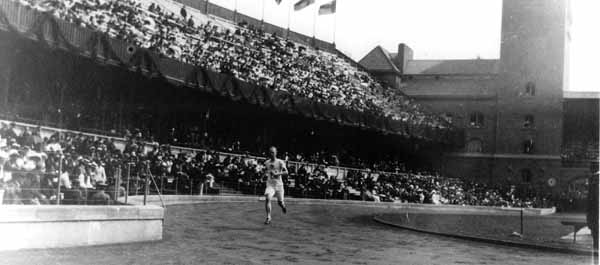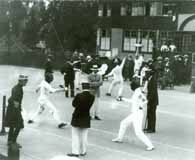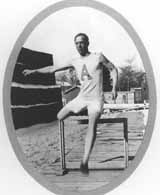A Very Different Olympic Games Part 2

Editor’s Note: This is part two of Carlo D’Este’s article on the 1912 Summer Olympics in Stockholm. Please click here to view Part 1: A Very Different Olympic Games.
When Lieutenant George S. Patton arrived in Stockholm, Sweden in July 1912 to compete in the modern pentathlon he had had very little time to train. What time was available for training was mostly aboard the ship that brought him across the Atlantic, hardly an ideal venue for preparing an Olympic athlete for competition.
{default}Besides Patton, there were forty-two other contestants in the pentathlon event, eight of whom were Swedish officers. Patton was the only American entered to actually participate. The day before the games opened Patton had ill-advisedly rested instead of engaging in some form of workout to keep himself loose, and had only practiced pistol shooting, firing a near perfect score (197 of 200), which boded well for the first day’s competition. However, he was restless and apprehensive, and barely slept the night before, in part due to the long summer days which brought scarcely an hour of darkness in high summer.
Nevertheless, Patton did poorly. He had shot well enough, and might have stood high in the pistol competition, but the oft-related tale is that one of his bullet holes could not be located in the target. It was thought that perhaps it had passed through the same hole from a previous round, and his generous Swedish competitors insisted this obviously must have been the case, but the missing bullet could not be located.
Consequently, the judges were obliged to penalize Patton ten points, and he wound up a dismal twenty-first. Beatrice blamed herself for his poor showing, later telling her daughter that, “her Georgie could not have failed on his own,” and if she had taken him back to their hotel earlier he would have won, a chivalrous gesture but hardly a probable reason. The tale of the so-called “lost round” is apocryphal. In reality, not one but two of Patton’s rounds missed the target, thus making it impossible for him to have won or even placed high in the pistol competition.
 On Day Two the number of competitors had dropped to thirty-seven. Patton did well in the 300-meter swimming event, finishing a very respectable sixth, although he was so exhausted at the finish that he had to be helped from the pool with a boat hook. The third and fourth days were devoted to fencing on the courts of the Royal Swedish Tennis Club in which Patton finished third of the remaining twenty-nine. The event was perhaps the most demanding of the five pentathlon events and required each man to fence with a dueling rapier that weighed nearly one and one-half pounds for three touches against every other competitor. Patton had good reason to be pleased with himself. “I was fortunate enough to give the French victor, Lieutenant Mas de la Tree, the only defeat he had.”
On Day Two the number of competitors had dropped to thirty-seven. Patton did well in the 300-meter swimming event, finishing a very respectable sixth, although he was so exhausted at the finish that he had to be helped from the pool with a boat hook. The third and fourth days were devoted to fencing on the courts of the Royal Swedish Tennis Club in which Patton finished third of the remaining twenty-nine. The event was perhaps the most demanding of the five pentathlon events and required each man to fence with a dueling rapier that weighed nearly one and one-half pounds for three touches against every other competitor. Patton had good reason to be pleased with himself. “I was fortunate enough to give the French victor, Lieutenant Mas de la Tree, the only defeat he had.”
Patton’s pugnacious, slashing, give-no-quarter, attacking style easily made him a crowd favorite but tactically often left him vulnerable to the finesse of his competitors, most of whom were far more experienced. Remarkably, of the twenty-nine opponents he met, Patton defeated twenty. It was a noteworthy achievement, especially for an American of limited experience who had never been tutored by a world-class teacher.
Patton’s offensive-mindedness with the sword was a harbinger of his future generalship on the battlefield. Throughout his career a disdain for defense was a Patton trademark. To attack was to succeed; to defend was to invite defeat. In 1912, barely three years out of West Point, George S. Patton attacked the pentathlon as later he would the German Army in World War II.
Now, only two events remained and, except for his disastrous placement in the pistol shoot, Patton would have been in bona fide contention for a medal. His chances were greatly enhanced by another third-place finish in his best event, the 5,000-meter steeplechase, where, on a borrowed Swedish cavalry horse, Patton and two Swedes registered a perfect score over the formidable course. The winners were then determined by the best time and Patton’s third place finish could only have been accomplished by a rider of championship caliber.
 The final day of the Modern Pentathlon was the dreaded 4,000 meter cross-country run. By this time there were a mere fifteen competitors left to line up in the Olympic stadium before the King’s Royal box to begin the race over a treacherous course that (under Olympic rules of the time) none of them had been permitted to view beforehand. The course wound through a twisting, hilly, forested path replete with mud-filled swamps. Even worse, it was an exceptionally hot day with high humidity that soon drained the energy of the runners. As was his custom, Patton simply ran as fast as he could, for as long as he could, without regard for pacing himself. It was yet another example of his utter refusal to settle for anything less than an all-out performance. Pacing oneself was for others; he would give it his best shot and damn the consequences.
The final day of the Modern Pentathlon was the dreaded 4,000 meter cross-country run. By this time there were a mere fifteen competitors left to line up in the Olympic stadium before the King’s Royal box to begin the race over a treacherous course that (under Olympic rules of the time) none of them had been permitted to view beforehand. The course wound through a twisting, hilly, forested path replete with mud-filled swamps. Even worse, it was an exceptionally hot day with high humidity that soon drained the energy of the runners. As was his custom, Patton simply ran as fast as he could, for as long as he could, without regard for pacing himself. It was yet another example of his utter refusal to settle for anything less than an all-out performance. Pacing oneself was for others; he would give it his best shot and damn the consequences.
Before the race his trainer had given him a shot of opium to provide additional stamina to help him through the race. Another name for opium is “hop” and its use was still legal in 1912. Although performance enhancing drugs have been outlawed in present-day Olympic competition, the “hop” given Patton probably did him little good and may even have hindered his performance other than inducing a feeling of well-being and spurring Patton to “run like hell” for the finish line.
Dressed in a white shirt and knickers Patton was the first to re-enter the stadium for the final dash to the finish line. Close behind him was a Swede, Gösta Asbrink, whom Patton later described as “a very hard and energetic sportsman.” As he neared the finish line Patton began to stagger and when he could no longer induce his legs to run, he began walking the final fifty meters. Asbrink passed him to win the race, as did another Swede who finished second. Patton somehow managed to cross the finish line in third place before he collapsed in a dead faint. Two of the other fifteen runners had also fainted, and one died in the torrid heat and humidity.
Patton might well have died. How long he remained unconscious is unclear but he later wrote that it was several hours, though that long a time is doubtful. “Once I came to I could not move or open my eyes and felt them give me a shot of more hop. I feared that it would be an overdose and kill me. Then I heard Papa say in a calm voice, ‘Will the boy live?’ And Murphy [the trainer] reply, ‘I think he will but can’t tell.’ ” Patton was severely dehydrated from his ordeal but the effects of opium under such conditions undoubtedly worsened the situation and might easily have killed a less well-conditioned athlete. Fortunately, he was young and at the peak of physical fitness, and thus survived the first of his many close brushes with death.
Patton ultimately finished fifth in the final pentathlon standings and, had he done better in his best event, the pistol, might have qualified for an Olympic medal, all of which were won by Swedes who had trained hard for eight months. Even so, his performance was superb; he defeated twenty of the twenty-nine fencers; and in swimming seventeen of the twenty-three competitors – this by a man whose only practice came in a canvas tank aboard ship. Small wonder the Swedish newspapers said of him, “His energy is incredible. In the distance running races, he returned to the stadium completely exhausted but did not falter . . . In the fencing, his calm was unusual and calculated. He was skillful in exploiting his opponent’s every weakness.”
When he left Sweden Patton’s accomplishments were little known outside of Los Angeles, which were reported in the local newspapers. The limelight in Stockholm belonged to another American, Jim Thorpe, whom King Gustavus V called, “the most wonderful athlete in the world.” Thorpe was the first man to win the modern decathlon and the track and field version of the pentathlon, only to be later stripped by of his Gold medals by the International OIympic Committee for having once played semi-pro baseball. It took until 1983 for the IOC to do the right thing and rightfully restore Thorpe’s medals.
Patton never spoke much about his Olympic experience, yet it was one of the great achievements of his colorful life.


0 Comments
Trackbacks/Pingbacks